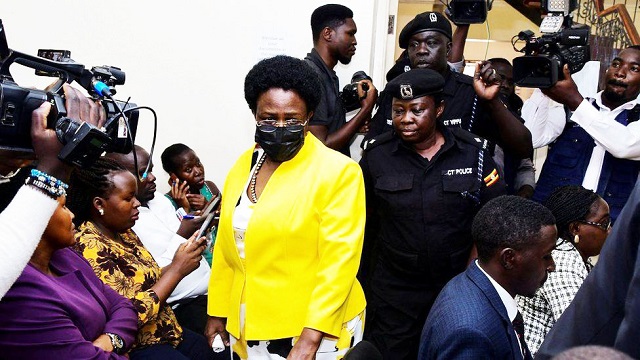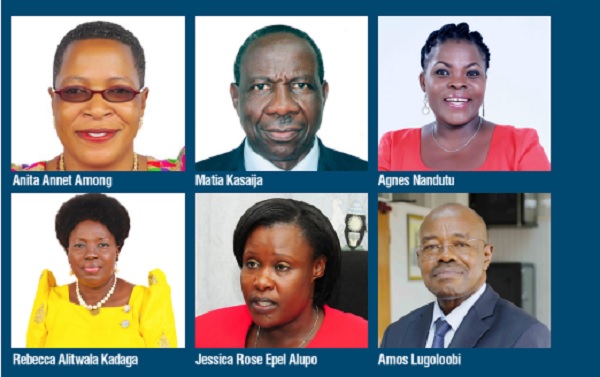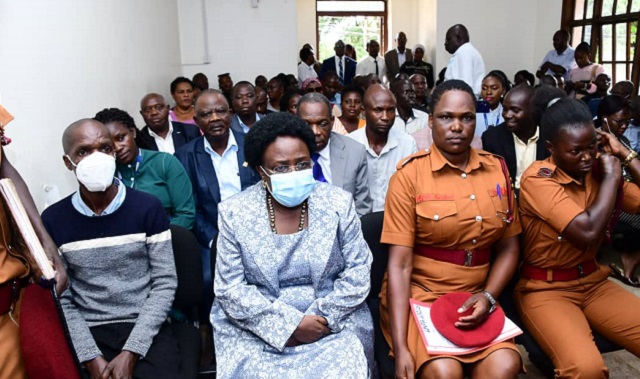
Which ‘petty thieves’ will Museveni spare or sack?
COVER STORY | RONALD MUSOKE | Moments after Dr. Mary Goretti Kitutu, the beleaguered Minister for Karamoja Affairs got bail on April 14, Godber Tumushabe, the Associate Director of the Great Lakes Institute for Strategic Studies, a Kampala-based public policy thinktank sounded cynical telling The Independent that it will not surprise him if Kitutu attends next week’s Cabinet meeting.
Kitutu had spent nine days in Luzira Prison following her remand on April 6 when she was charged with loss of public property and conspiracy to defraud the government at the Anti-Corruption Court in Kampala.
Although her bail application was quashed on April 12 because of failure to produce substantial sureties, this time, Kitutu and her brother, Michael Naboya, were released on a cash bail of Shs 10 million each while her sureties were bonded Shs 200 million each (not cash).
But, just a few hours after Kitutu got bail, Amos Lugoloobi, the Minister of State for Finance and Planning, was arrested after showing up at the Criminal Investigations Directorate (CID) headquarters at Kibuli to record a statement. He is now expected to also be charged in court.
Kitutu and Lugoloobi are among the close to 20 high ranking government officials who have been sucked into the so-called iron-sheets scandal. The list includes Jessica Alupo, President Yoweri Museveni’s deputy (Vice President); Robinah Nabbanja, the Prime Minister; Rebecca Kadaga, the First Deputy Prime Minister and; Annet Anita Among, the Speaker of Parliament—all senior officials of the National Resistance Movement—the ruling party which Museveni leads.
Peter Wandera, the executive director of the Uganda Chapter of Transparency International, a global anti-corruption organization, told The Independent on April 14 that he thinks President Museveni has never been in a bigger dilemma than he currently finds himself in.
“When you consider the fact that this scandal involves NRM’s most trusted and most praised lieutenants, President Museveni finds himself in a dilemma,” Wandera told The Independent, “He is torn between taking action and maintaining the NRM party cohesion.”
Faced with this dilemma, Wandera says Museveni might “sacrifice” some people and protect others.
In a letter addressed to Prime Minister Nabbanja, President Museveni appears to be moving into the duo-pronged approach hinted on by Wandera and other pundits.
In the letter, Museveni attempts to segregate the nature of crimes committed by his ministers based on some subjective criteria. He then warns those implicated that he would “take political action” on some and leave others to be handled by the police as criminals once the investigations, which are currently being undertaken by Police, Parliament and the Inspectorate of Government, are complete.
“There are two issues of wrong-doing involved. If somebody took Mabaati (iron sheets) meant for the Karachuna (Karimojong warriors) and gave them to people or institutions in his or her constituency, this is political corruption,” Museveni wrote on April 3.
“It is like bribing voters so as to get political favours. In the case of the Mabaati, it is at the expense of the Karachuna, but also at the expense of security of the country.”
“Remember, this giving of Mabaati to the Karachuna is part of removing them from causing insecurity. Those ministers are therefore, undermining that in exchange of cheap popularity. This is actually subversive. Under the NRA Code, cheap popularity is characterised as subversive.”
Museveni advised such subversive ministers who were “consciously involved” to take personal responsibility, pay back the value of the iron sheets they diverted before he takes his decision on the “political action” to punish the mistake.
“Those who were unconsciously involved, should return the Mabaati, if they are still available or personally re-imburse the value of the Mabaati they diverted,” he says.
Then he turns to the second category; those most likely to be “sacrificed.”
The second issue, he says, are those who took the Mabaati for personal use.
“This is not just a political mistake, it is theft,” he says, “Those involved must both bring back the Mabaati or equivalent value in money but also be handled by the Police under the Criminal laws of the country. I will also take political action once the police have concluded their investigations.”
Genesis of iron sheets scandal
In the 2021/2022 Financial Year, Parliament passed a Shs39 billion budget for relief efforts to Karamoja and other sub-regions which are under government’s affirmative action. In the case of Karamoja, the decision was prompted by the famine that had struck the region. Buying iron sheets was part of the efforts aimed at restoring peace in the livestock raiding-riven region by ensuring permanent settlements for the nomadic Karachuna (warriors) who are the alleged perpetrators.

Under this arrangement, 95,658 pieces of iron sheets were procured for the Karamoja sub-region. However, in February, this year, it was revealed that some of these iron sheets had been distributed to ministers and not the Karimojong intended. By that time, 25,514 iron sheets had been released.
The Permanent Secretary in the Office of the Prime Minister, Keith Muhakanizi, who passed away on April 13, halted the distribution. The news came out apparently after one of the relatives of the Minister for Karamoja Affairs tipped off security after being denied a share of the iron sheets when the other relatives were selling them.
This opened a lid on all the other ministers that received the iron sheets. Many claimed to have used the iron sheets to roof public institutions like schools, health centres and churches. But others, like Minister of State for Finance and Planning, Lugoloobi, did not have such cover. He had used them to roof his goats’ shed, for example.
Others, like Agnes Nandutu; the Minister of State for Karamoja, kept them in personal storage. Preliminary investigations also show that Nandutu used the iron sheets to roof her apartments and that CID officials were able to retrieve only a few that she had not used yet.
Meanwhile other iron-sheets recipients, such as Speaker of Parliament Anita Among and Prime Minister Robinah Nabbanja, have offered fumbled explanations in an attempt to clear their names. Speaker Anita Among told Parliament that she had given the iron-sheets to government schools in her constituency. But the delivery note The Independent has seen shows the iron sheets were delivered at her private school, Bukedea Comprehensive School and signed for by a representative of the head teacher of that school.
Some of her handlers have said her school only acted as a store for the 500 pieces of iron sheets which were later taken to the beneficiary public schools. But they have failed to answer questions that followed, such as whether Bukedea District does not have district stores.
Game wardens become poachers
President Museveni also used his twitter handle to explain to young Ugandans whom he often refers to as Bazzukulu (grandchildren) of how his government has the corruption issue under control. “The issue of corruption, is a “musota muntamu” (snake in a clay cooking pot) that needs careful handling without breaking the pot, he tweeted on April 11.
“The NRM has handled bigger issues. That is why Uganda no longer has a refugee problem. Everybody knows that (they) cannot be falsely accused and even the ones who are accused, are safe in custody. Therefore, some game wardens have failed themselves and become poachers but the system is working.”
Museveni said he was now considering instituting another anti-corruption unit at the village level to tackle the challenge at the lowest level.
“All these layers—District Councils, Parliament, Local Councils, public barazas, were put there deliberately by us on account of what we have been witnessing since the colonial times—officials betraying the people. If one layer does not work, the other will.”
President Museveni’s public threats appear to have worked.
On April 13, Speaker of Parliament, Anita Among’s handlers returned the 500 iron sheets she took to the Office of the Prime Minister’s store in Namanve, Mukono District. Minister Lugoloobi’s handlers also delivered some pieces of the iron sheets to the stores on April 14 before he was arrested the same day.
But, Rebecca Kadaga, the former Speaker of Parliament and current First Deputy Prime Minister and Minister for East African Community Affairs told the Presidential Affairs Committee which is currently investigating the scandal that she would not return the iron sheets. She instead offered to buy them.
Kadaga told the committee on April 13 that she had no clue that she was picking iron sheets exclusively meant for the Karachuna of Karamoja. She said the reason she accepted Kitutu’s offer was because her constituents in Kamuli District needed roofing material for different community projects. Besides she added, the OPM had not been in position to help after she had previously written and asked for help in August, 2022.
A number of facilities in Kamuli District including schools, health centres, churches and households were damaged after hailstorms. “I received requests from the population for relief. So, I wrote to the Office of the Prime Minister requesting for support,” she said.
“The Permanent Secretary of the OPM (Office of the Prime Minister) wrote back and said that they did not have anything and that I should look elsewhere. So, I tried the ministries of Education and Health, but nothing was forthcoming. So, I continued waiting because of the Office of the Prime Minister is the place where we all report for relief,” Kadaga said.

It was then in October that Kitutu made the offer to help. Kadaga was given 500 iron sheets. Kadaga told the committee that the iron sheets are still in her stores as she waits for her constituents to mobilise resources to buy timber for roofing.
When quizzed whether she intended to return the iron sheets, Kadaga said: “I am not going to return them. “I will pay for them because I want to do the work for which they were bought. Those children must have their schools and women must have their health centre.”
Toothless Museveni
It is utterances by ministers like Kadaga that Godber Tumushabe bases upon to say President Museveni has no capacity to fight corruption in this country because his entire regime survival project depends on corruption.
“Even if he had the will to fight corruption, he is incapable of doing so because that would go against his regime survival objectives,” Tumushabe told The Independent.
Reacting to Museveni’s engagement with the young Ugandans on Twitter, Tumushabe told The Independent that the president’s explanations via his social media platform only serves to exonerate him.
“It is completely deliberate; he wants to engage the Bazzukulu so he avoids responsibility,” Tumushabe explained.
Going forward, Wandera thinks President Museveni should consider getting to the very bottom of this scandal because, “Usually corruption happens before it happens.”
“Who exactly conceived this project? Did somebody convince the President knowing that this would be another channel for stealing public funds? Was there a needs assessment that concluded that the Karachuna actually needed iron sheets? Looking at the tail-end of this issue might leave a lot to be desired.”
Wandera added: “What we need is a big detailed investigation, if at all, we should have one. For now, he has not acted firm enough in regards to the issue. It is not a matter of asking the culprits to return the iron sheets or to refund the money.”
For Leonard Okello, the CEO of the Uhuru Institute, he finds nothing much to say about the iron sheet scandal that has sucked in close to 20 ministers of President Museveni’s Cabinet.
“After reading President Museveni’s letter, I have no comment to make.”
He adds: “No comment can be a comment in itself.”
But Godber Tumushabe told The Independent that there are two elements in the iron sheets saga; the criminal liability and political responsibility that President Museveni must not run away from.
Tumushabe noted that if Uganda were a functional democracy, the criminal aspect of this case should have been handled by independent prosecutorial institutions such as the Police and the Office of the Director of Public Prosecutions and Museveni would have no role.
President Museveni’s role, Tumushabe explained, would be stewarding his ministers to take responsibility by either asking them to resign or sacking them.
“He is supposed to take care of that because political responsibility is an issue of public trust; you either resign or the appointing authority fires you,” Tumushabe said. “He does not need to explain to us how he is waiting for the investigations for him to take political action.”
Tumushabe told The Independent that the only reason why the iron sheets scandal may not amount to anything is because President has nurtured the vice. “He is both the author and the architect of corruption in this country,” he said. “How is it possible that you can be the only one who is clean, you have character and integrity but you end up being surrounded by petty thieves?”
******
RELATED STORY
 The Independent Uganda: You get the Truth we Pay the Price
The Independent Uganda: You get the Truth we Pay the Price




For me this whole saga must start with OPM giving an accountability of 39billion shs in question. How many iron sheets and goats were bought in the first place. Is the stolen property amounts to the total budget.?
That is my thought